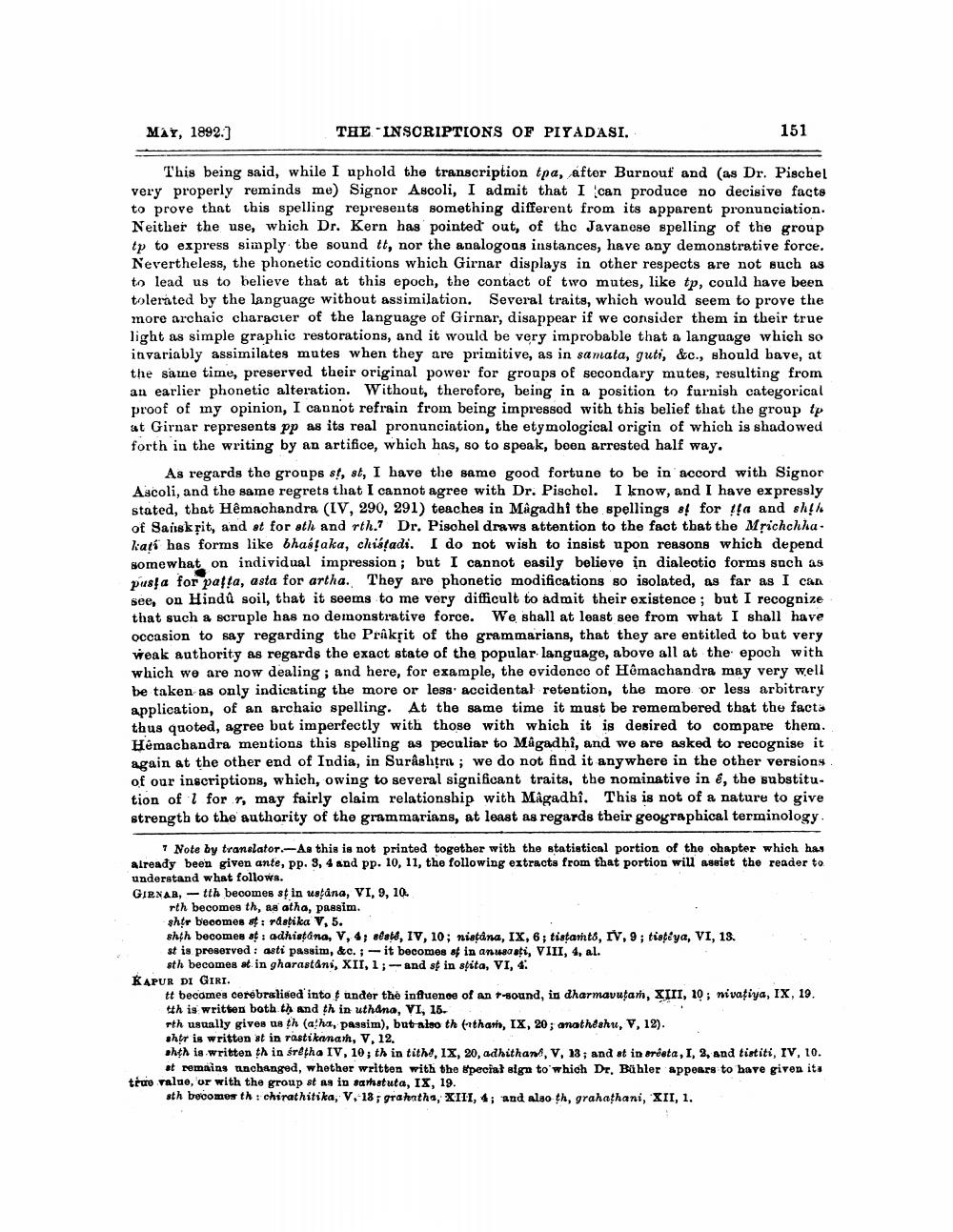________________
MAY, 1892.)
THE INSCRIPTIONS OF PIYADASI.
151
This being said, while I uphold the transcription tpa, after Burnout and as Dr. Pischel very properly reminds me) Signor Ascoli, I admit that I can produce no decisive facts to prove that this spelling represents something different from its apparent pronunciation. Neither the use, which Dr. Kern has pointed out, of the Javanese spelling of the group tp to express simply the sound it, nor the analogous instances, have any demonstrative force. Nevertheless, the phonetic conditions which Girnar displays in other respects are not such as to lead us to believe that at this epoch, the contact of two mutes, like tp, could have been tolerated by the language without assimilation. Several traits, which would seem to prove the more archaic character of the language of Girnar, disappear if we consider them in their true light as simple graphic restorations, and it would be very improbable that a language which so invariably assimilates mutes when they are primitive, as in samata, guti, &c., should bave, at the same time, preserved their original power for groups of secondary mutes, resulting from an earlier phonetic alteration. Without, therefore, being in a position to furnish categorical proof of my opinion, I cannot refrain from being impressed with this belief that the group tp ut Girnar represents pp as its real pronunciation, the etymological origin of which is shadowed forth in the writing by an artifice, which has, so to speak, been arrested half way.
As regards the groups st, st, I have the same good fortune to be in accord with Signor Ascoli, and the same regrets that I cannot agree with Dr. Pischol. I know, and I have expressly stated, that Hêmachandra (IV, 290, 291) teaches in Magadhi the spellings 8! for !!a and sh! of Saitskpit, and at for sth and rth.7 Dr. Pischel draws attention to the fact that the Mrichchha. kati has forms like bhasļaka, chistadi. I do not wish to insist upon reasons which depend somewhat on individual impression; but I cannot easily believe in dialectic forms such as pusga for patta, asta for artha. They are phonetic modifications so isolated, as far as I can see, on Hindu soil, that it seems to me very difficult to admit their existence; but I recognize that such a scruple has no demonstrative force. We shall at least see from what I shall have occasion to say regarding the Prakrit of the grammarians, that they are entitled to but very weak authority as regards the exact state of the popular language, above all at the epoch with which we are now dealing ; and here, for example, the evidence of Hômachandra may very well be taken as only indicating the more or less' accidental retention, the more or less arbitrary application, of an archaio spelling. At the same time it must be remembered that the facto thus quoted, agree but imperfectly with those with which it is desired to compare them. Hémachandra mentions this spelling as peculiar to Magadhỉ, and we are asked to recognise it again at the other end of India, in Surashtrı; we do not find it anywhere in the other versions of our inscriptions, which, owing to several significant traits, the nominative in é, the substitution of 1 for r, may fairly claim relationship with Mågadhî. This is not of a nature to give strength to the authority of the grammarians, at least as regards their geographical terminology
* Note by translator.-As this is not printed together with the statistical portion of the ohapter which has already been given ante, pp. 3, 4 and pp. 10, 11, the following extracts from that portion will assist the reader to understand what follows. GIRNAR, - tth becomes st in ustana, VI, 9, 10.
rth becomes th, as atha, passim. shtr becomes st: rástika , 5. shth becomes at: adhistāna, V, 4; slate, IV, 10; niatána, IX, 6; tistants, IV, 9; tistêya, VI, 13. st is preserved : asti passim, &c. ; - it becomes of in an asti, VIII, 4, al.
sth becomes at in gharastani, XII, 1; - and st in stita, VI, 4: KAPUR DI GIRI.
tt becomes cerebralised into t under the influence of an t-sound, in dharmavutan, XIII, 10; nivaţiya, IX, 19. tth is written both th and th in uthana, VI, 15. oth usually gives us th (a!ha, passim), but also th fatham, IX, 20; anatheshu, v, 12). shtr is written st in rastikanan, V, 12. shth is written th in śretha IV, 10;th in titha, ix, 20, adhithan, V, 13; and at in srieta, 1, 2, and tistiti, IV, 10.
at remains unchanged, whether written with the special alga to'which Dr. Bahler appears to have given itu true value, or with the group st as in samstuta, IX, 19.
sth becomes th: chirathitika, V, 18 grantha, XIII, 4; and also th, grahathani, XII, 1.




